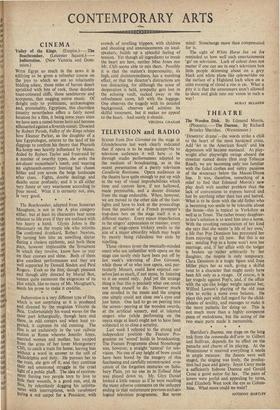THEATRE
The Wooden Dish. By Edmund Morris. (Phoenix).—The Duenna. By Richard Brinsley Sheridan. (Westminster.)
'DOMESTIC drama'—the words strike a chill to the heart of the most hardened critic. Add `get in the American South' and his depression will become maniacal. As play- wright after playwright swings aboard the streetcar named desire (first stop Tobacco Road), we are becoming only too familiar with the faded clothes and sultry passions of the sexocracy below the Mason-Dixon line, It was, therefore, something of a relief to find that Edmund Morris's new play dealt with another problem than the lack of conventions to express hatred and lust by anything other than lust and hatred. What is to be done with the old father who is becoming too senile to be tolerable about the houSe—this is topical in Yorkshire as well as in Texas. The rather brassy daughter- in-law's solution is to send him into a home. With the revolting romanticism of her kind she says that she wants 'a life of her own,' a• life that Pop Dennison has prevented her from enjoying up till now. But this is no use: sending Pop to a home won't save her marriage, and, if her affair with the lodger is broken up rather arbitrarily by her daughter, the respite is only temporary. Clara Dennison is a tragic figure and Joan Miller plays her as such, giving a skilful twist to a character that might easily have been felt only as a virago. Of course, it is her tragedy against Pop's, and, if the affair with the ape-like lodger weighs against her, Wilfred Lawson's playing of the old man tries to strike a more even balance. He plays this part with full regard for the child- ishness of senility, and manages to make it the more pathetic for doing so. This is not much more than a highly competent piece of melodrama, but the acting of the two main parts made it memorable.
• • •
Sheridan's Duenna, one stage on the long ' trek from the commedia dell'arte to Gilbert and Sullivan, depends for its effect on the panache and charm of its playing. At the Westminster it received everything it needs in ample measure: the dances were well staged, the singing was lively, the produc- tion had pace and gaiety. Joyce Carey made a sufficiently hideous Duenna and Gerald Cross a good suitor for her. The pairs of lovers were joyful and appealing by turns, and Elizabeth West took the eye as Colum- bine. What more could we want?
ANTHONY HARTLEY


































 Previous page
Previous page